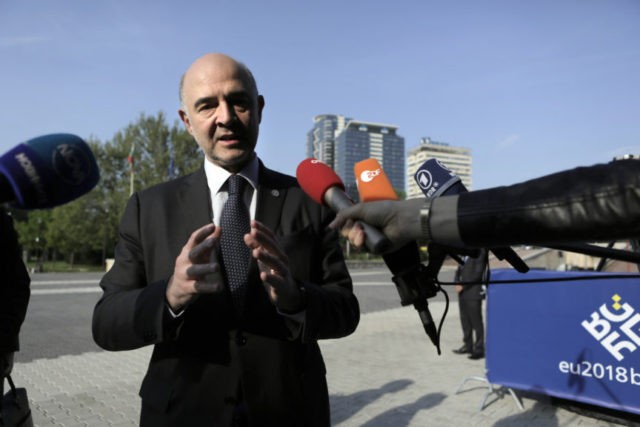ATHENS, Greece (AP) — Greece’s creditors said Friday that the country is on track to reach a final deal on June 21 on fully exiting its international bailout in August, though work remains to be done and debt inspectors will return to Athens next month for a final review.
Speaking in Sofia, Bulgaria, after a meeting of the finance ministers of the European Union’s 19-member eurozone, Finance Commissioner Pierre Moscovici said Greece was essentially on track to meet its reform commitments, “but there are still a few efforts to be conducted.”
Among key issues are the handling of banks’ soured loans and property foreclosures.
Greece is set to emerge from its third and final bailout on Aug. 20, after eight years of relying on emergency loans from international creditors. In return, it has had to push through repeated rounds of deep spending cuts, structural reforms and privatizations and its economy has been under strict supervision by its creditors.
The government has committed to continuing reforms after the end of the bailout, but has resisted the idea preferred by some, including the country’s central bank, of taking a so-called precautionary credit line — a backup loan it could use as it eases back into international bond markets.
A credit line would likely involve more stringent government austerity measures and heavier international oversight, which would make it politically unpopular. Instead, the left-led coalition government has insisted on a “clean exit” from the bailout.
Finance Minister Euclid Tsakalotos presented the government’s proposals for growth in the post-bailout era to the finance ministers at the Sofia meeting.
“The strategy is to boost Greece’s long-term growth potential and enhance the investment climate. Importantly, it underlines Greek ownership of the reform process” after the bailout, said Mario Centeno, who chairs the eurozone finance meetings known as the eurogroup. “This exercise is key for the future of Greece.”
Moscovici stressed the need for a a surveillance program after the end of the bailout.
“We really are now in the final straight,” he said. “We have undoubtedly already covered 90 percent of the way. The effort mustn’t stop now, it must go all the way. The last 10 percent isn’t necessarily the simplest, but it must be done and we will do it together.”
The debt inspectors will return to Athens on May 14 for the fourth and final review of the last bailout, said Centeno.
“We saw some good news from Greece lately, namely on the fiscal side,” said Centeno, noting the country had posted a primary surplus — the budget balance minus debt repayment — of over 4 percent of gross domestic product for a second year. “This is very encouraging given the track record.”
Athens also expects some form of debt relief at the end of its bailouts, as promised by its creditors.
“The final decision on the implementation of the debt measures will be taken, if needed, at the end of the program,” Centeno said.
____
Derek Gatopoulos in Athens contributed.

COMMENTS
Please let us know if you're having issues with commenting.